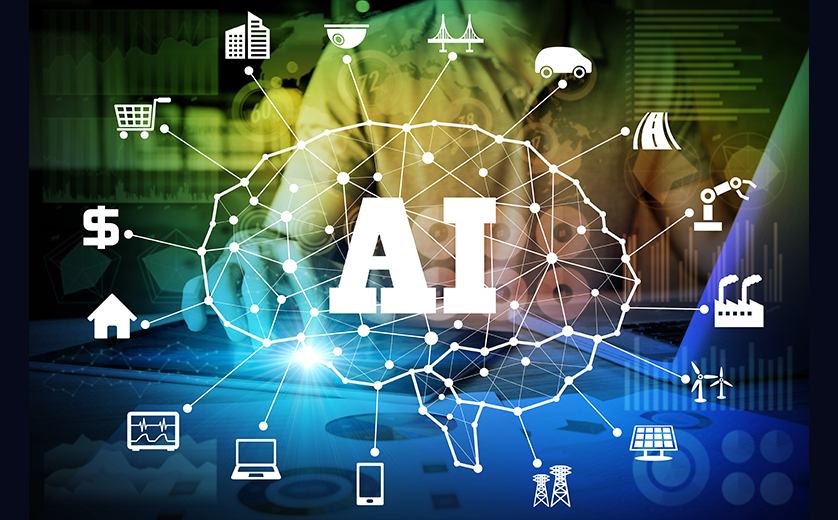The intelligence may be artificial, but the enthusiasm for it is genuine.
Artificial Intelligence (AI), characterized by machine and deep learning, will be the subject of several Open Classroom programs beginning Oct. 14 — and taught for the first time at the Brown School in two courses next year. AI is already transforming large swaths of science and industry in fields such as engineering and computer technology, but has been less prominent in the social sciences.
“As policy analysts and quantitative modeling practitioners, we have applied a wide range of statistical methods to analyze patterns from structured data, but most data we encounter day-to-day is unstructured, such as images, texts, and video or audio recordings,” said Ruopeng An, associate professor at the Brown School who is leading the AI effort. “The traditional statistical methods are not well-equipped to process huge datasets in the magnitude of gigabytes and terabytes, and the challenge becomes even greater when these data are unstructured.”
In AI, new algorithms are created to analyze massive, unstructured data and suggest solutions to thorny problems in social work and public health. In California, for example, housing authorities are using AI to help assessors re-evaluate the value of real estate and plan strategies for affordable housing. Some government agencies can use AI to predict changes in the price of commodities and design policies to respond to higher food prices, particularly in lower-income communities.
“AI and social sciences need each other,” An said. “Social sciences need AI to revolutionize their methodologies to observe, interpret, and analyze phenomena better; AI needs social sciences to mitigate potential harms of real-world applications and to ignite positive social change.”
Open Classroom is a popular series of midday presentations that are free to the public and recorded for later viewing on the Brown School’s YouTube channel. The AI series, aimed at general audiences, will introduce AI-related technologies and applications for social sciences. No previous exposure to AI or computer programming is needed to be able to follow the presentations. Complementary references (e.g., tutorials, textbooks, software packages, APIs, data sources) will be provided for those interested.
An will lead the initial presentation on Oct. 14, introducing AI and its potential uses in the field of social sciences. Future classes will examine ethical issues surrounding AI (its potential misuse and biases), AI’s impacts in e-commerce and international trade, computer vision, and natural language processing. The series will conclude in May.
One of the biggest opportunities that AI offers to social scientists is to better understand data and translate it across culture. That’s what drew Niki Fang, a second-year PhD student at the Brown School, to a workshop An held this past summer to introduce students to AI. Forty students attended.
“I believe this area can be very beneficial in the future,” said Fang, whose research focuses on support for parents with autistic children. She said AI might help families to do the initial screening for autism or to establish a support system across cultures. “Currently, we have a lot of online tools to help with therapy, but they’re based on English and not appropriate to use in the Chinese context.” Fang will be a teaching assistant for one of the new courses An will teach, and eventually plans to return to her home in China to work.
“The most interesting part of AI is how powerful it is,” she said. “We’re able to use it to dig out much more information from non-numerical data.”
Danyi Li, MSP/MPH ’22, also attended the workshop, her interest piqued by a book on AI she had read as an undergraduate. “I was so amazed about how big data and AI may change our life, said Li, whose concentration is in epidemiology/biostatistics. “Social scientists spent thousands of years exploring the philosophy of causal relationships, but in an era of Big Data, we may be able to act based on correlations instead of causality. The new technologies may be a revolution to classic statistics and quantitative methods.”
Li has collected poverty-alleviation policies from Chinese central and local government websites and thinks AI can be useful in analyzing those texts. “AI methods can deepen our knowledge, especially the knowledge about human society,” she said.
The new courses will be offered in the spring and fall of 2022, and eventually, An plans to offer a post-master’s certificate on AI and a new public health specialization.
The spring course, Applied Machine Learning Using Health Data, will teach popular machine learning models using Python and their applications on health data. The course focuses on the practical applications in solving real-world questions using publicly available health data.
The fall course, Applied Deep Learning Using Health Data, is built upon the spring course and teaches popular deep learning models and their applications on health data. Their applications are rapidly expanding from outbreak prediction to medical imaging and from patient communication to behavioral modification. In this course, students will have the opportunity to work on real-world projects utilizing the AI models learned.
